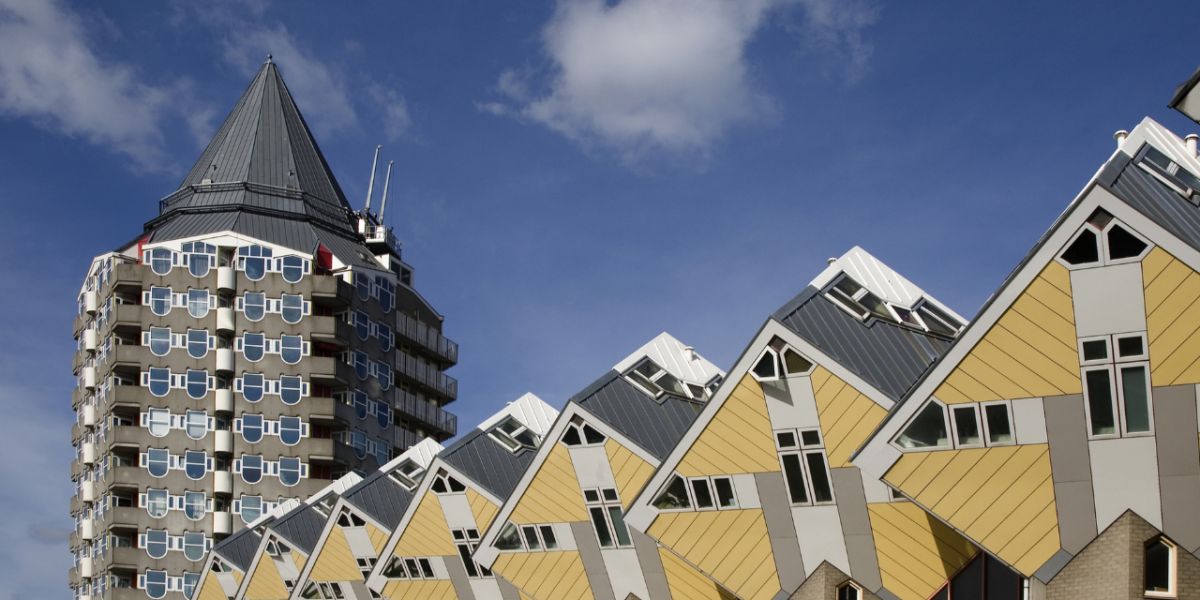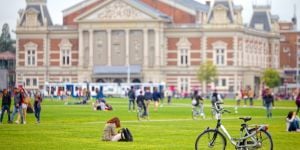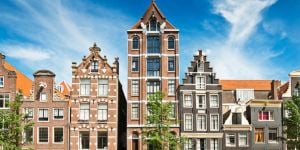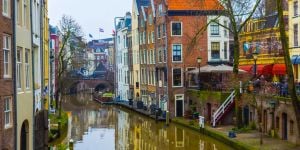
Rotterdam is home to the largest shipping port in the world; no doubt you've heard of this big and important city. It was almost completely destroyed in WWII, which means its architecture is somewhat unique to the rest of the Netherlands. Instead of finding traditional brick houses that are only a few stories high, you'll discover that Rotterdam looks like a modern American city, complete with wide streets. If you want to live in Rotterdam, then keep reading to find out more.
Types of accommodation in Rotterdam
The types of accommodation available in Rotterdam include the following: room, studio, apartment, house, and houseboat. If you're only planning on staying a short while, or you need somewhere temporary to stay while looking for accommodation, there are also short-stay options like hostels, hotels, and Airbnbs.
To get a start, you can check Pararius and Funda.
Which are the most popular neighborhoods in Rotterdam?
Take a look at some of the most popular neighborhoods in Rotterdam.
The Triangle
The Triangle used to be the center of Rotterdam. If you lead a very social life, you'll love it here, as there are lots of bars, restaurants, clubs, and other stores.
Note that rent prices are a bit higher here because of its location.
City Center
If you want to be in the midst of everything, why not consider living in the city center? There are both historical buildings (from the 1900s) and modern builds, so you'll have a nice selection of housing, ranging from apartments to villas.
Living in the city center puts you close to all the local attractions, as well as good restaurants and shops. If you've got kids, it also puts you close to the Rotterdam International School. You're also close to the Erasmus Medical Center, which is the largest hospital in the nation.
A caveat to living in the city center is that it's hard to come by parking. So if you're planning on driving, parking can be a headache. Also, rent will be the highest here, as you're paying for convenience. Another downside is that as with most city centers, you'll find more crime here. Still, it's not as nearly as bad when compared with large American cities.
Blijdorp
If this neighborhood sounds familiar, it's because it's home to the Blijdorp Zoo. If you end up on the west side of this neighborhood, then the zoo will be right at your doorstep. Not only that, but Blijdorp is very close to Rotterdam Central Station, so you'll have great transport connections.
Not only is this neighborhood expansive, but it's also very green. You've got two parks, the Vroesenpark and the Roel Langerakpark, so it should be no surprise that many families move here.
Kop van Zuid
If you have money to spare and love living in luxury, then you'll feel right at home in Kop van Zuid (Head of the South). This is a posh neighborhood that attracts young and trendy expats, so expect rent prices to be a bit higher. You'll find it in the city center but also on the southern side of the Nieuw Maas, which is a part of the Rhine River. It has a fantastic view of the Erasmusbrug, as well as the water.
Because of its location, Kop van Zuid's housing consists of renovated old warehouses. But in addition to that, you'll also find newer properties, such as luxury houses and apartments. Don't expect any of these to be cheap, though, as they'll all have high price points. If you're looking to splurge and live in luxury properties, then look on the opposite side to Nieuwewerk and Scheepvaartkwartier (the Maritime Quarter). These properties are all newly renovated, which will guarantee comfort.
This neighborhood is home to the 7th tallest building in the Netherlands: De Rotterdam. It was completed back in 2013 and added over 200 apartments and offices to Rotterdam.
Kralingen
This neighborhood is home to the Kralingen Bos. This is a park with a lake where you can swim and sail. It's also home to the Erasmus University and the University of Applied Sciences, so if you're a student, then this is an ideal housing location.
Although there's student housing in Kralingen, you'll also find anything from social housing to multi-million-euro mansions in this neighborhood. As a result, you'll find it pretty diverse here. Mostly, if you're single, live with a partner but don't have kids, and you're young, then Kralingen should be a fantastic neighborhood to reside in.
Noordereiland
This is a small island that most people overlook when looking for accommodation in Rotterdam. It's one of the few places that weren't bombed in WWII, so you'll get to enjoy historical buildings here. It's less than a five-minute bike ride away from the city center, so you won't be far from all the action. This island is connected by the Willemsbrug and De Hef, so it's easy to get around to the city center and to Rotterdam Zuid (Rotterdam South). And considering it's an island, you'll be surrounded by beautiful water (the Nieuwe Maas).
While the island does have good bridge connections, public transport isn't its strong point. So if you're planning on commuting by public transport, you might want to consider other more convenient neighborhoods.
Rent prices are also a bit higher in Noordereiland. This makes it not an ideal place to live if you're on a budget.
Hillegersberg
This is another rare neighborhood that escaped the bombings of WWII. Hillegersberg is located to the northeast of the city and is considered a suburb. When you arrive in this neighborhood, you'll instantly be charmed by the old village center and quaint residential streets. Not only that but there are two lakes nearby. So for nature lovers, you'll be able to go swimming, sailing, and skating at these lakes. You can also bike out just a few minutes to the surrounding meadows and the River Rotte.
Admittedly, properties in Hillegersberg are expensive. However, if you want to live somewhere where you'll feel at home with other expats as well as native Dutchies, then Hillegersberg is a good place to live. There are also lots of detached homes if you want more privacy. Otherwise, terraced homes are your main option.
If you're bringing the entire family with you, then this is a good neighborhood to be in as well. You'll find the Nord Anglia International School here, which is the only international school outside of Rotterdam's city center. An alternative is Stephanus School, which does take expat children too.
Another plus point of Hillegersberg is it only takes 20 minutes to drive to the city center. If you take the bus or tram, this journey is reduced to 10 minutes.
Ommoord (Prins Alexander)
You'll find Ommoord in the northeast of Rotterdam. It's the ideal suburb for families, so it's no surprise that you'll find other families like yours if you choose to settle down here.
The properties here are reasonably priced and most are suitable for young families. Ommoord also has a peaceful atmosphere and plenty of green spaces, so it's the perfect environment for you to raise your kids in.
Rotterdam West
Rotterdam West is very close to the city center, so you won't be far away from all the liveliness. Rent prices will vary in this neighborhood; one block will be cheap, while the next one will be expensive. It's pretty diverse, so explore it to make sure you like the area. It's especially nice for artists, as there's a huge scene here.
Oude Westen
Oude Westen (The Old West) is great for those who need to commute since this neighborhood is next to Rotterdam Central Station. If you enjoy living in a melting pot, then you'll love it here, as it's a multicultural suburb. You just might find other expats who are from the same country as you.
Oude Westen also has a bohemian feel, so if you're looking for a sleepy suburb, you won't get it here. This neighborhood is full of life!
Delfshaven
You'll find Delfshaven on the west side of Rotterdam, and it's by the water. It's another rare place that survived WWII bombings, so it has old-school architecture here.
Rent is pretty pricey in Delfshaven, but it's quiet. Also, it has great connections with the city center.
Prinsenland
For convenience and affordability, you can't beat Prinsenland. This neighborhood has rent prices that are much lower than those you'll find in the city center. And if you've got little ones, then you'll be pleased to know that Prinsenland is centrally located to local international schools.
Feijenoord
Feijenoord is a neighborhood located in Rotterdam Zuid. It's true that this area didn't have the best reputation in the past, but in the last few years, effort's been made to transform Rotterdam Zuid (and Feijenoord) into a safe and reputable place to live in. However, do note that public nuisance is still a common issue, so it may not be the best place for families who want a quiet space.
Today, Feijenoord is a working-class neighborhood that has affordable housing. It's also a melting pot that has a majority of non-Western expats, as well as Dutchies.
Rent prices in Rotterdam
Since Rotterdam is a part of the Randstad, its rent prices are about the same as the other cities. A one-bedroom apartment will cost over €1,500 a month, with many neighborhoods costing nearer to €2,000 a month. A studio will cost upwards of €800, with most neighborhoods closer to €1,000.
Keep in mind that the whole country is experiencing a housing crisis that doesn't seem like it'll go away anytime soon. This means that in general, it'll be difficult to find housing, and when you do, it'll probably be pricey. So if you know you're moving to Rotterdam, it's best to start searching for accommodation right away.
Lease conditions and procedures in Rotterdam
When you have an interest in a living space, you'll typically get in touch with the agent or the landlord directly. You'll arrange for a meeting, and if you still want to rent, you'll let the agent or landlord know. If there are other candidates, they'll consult with the landlord to see which tenant they would prefer. Otherwise, the landlord will go over the potential candidates themselves.
If you're chosen, the agent will contact you with a lease contract in Dutch and a supplementary one in English. After you sign and return the contract, the agent will meet with you to hand you the keys and show you around.
In the initial walkthrough, make sure that everything works and any existing damage is documented. That way, you won't be charged for it when you move out. During this time, the agent will also show you where communal things are, such as the laundry room or bike shed.
Before renting, make sure the property allows you to register there. Otherwise, the landlord is most likely renting it out illegally to get some taxes breaks.
How to buy property in Rotterdam?
You won't need to be a resident to buy property in the Netherlands, so if you wish to buy an apartment or home right when you arrive, you can. However, to get a mortgage in the Netherlands, it helps immensely to have a permanent contract at a Dutch company, which proves you can pay off your large loan. If you're an entrepreneur or freelancer, then you'll need to produce at least three years' worth of work history and client contracts in your time in the Netherlands. The more years you can show, the better. Also, if you're a non-EU citizen, it can be more difficult to obtain a mortgage and buy property, so be prepared for some obstacles.
If you're set to buy property, then you'll need a notary and a sales contract (koopakte). The notary can then take care of the deed documents (leveringsakte) and mortgage (hypotheekakte) if needed.
Both markets for renting and buying are overly saturated, as there's just not enough housing to go around. While property prices were still high in 2020 and in previous years, mortgage rates were historically low, hovering around 1%. In 2024, they're now between 4.1% to 5%, and it's not uncommon for interested buyers to way overbid.
While the housing market in Rotterdam is slightly cooling in other cities in the Randstad, it had a higher than average growth in year-on-year prices in the first quarter of 2022. But don't let that discourage you, though, as the average asking price is under €400,000, which is still significantly cheaper than properties in Amsterdam.
If you're still interested in buying property in Rotterdam, then it's well worth your time to work with a mortgage advisor and/or real estate agent, especially one that specializes in working with expat clients. Not only can they help you navigate the entire process, but they also know all the laws and the language. It can make buying property a lot easier, especially if it's your first time.
We do our best to provide accurate and up to date information. However, if you have noticed any inaccuracies in this article, please let us know in the comments section below.








